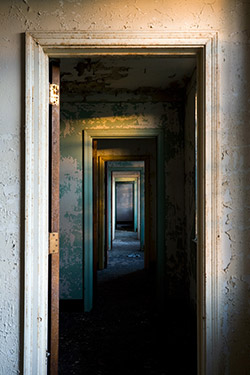If you’ve ever walked into a room to get your keys and forgotten what you’re looking for, or found yourself staring into the fridge wondering what it was you came to the kitchen for, then you’ve experienced the Doorway Effect.
It’s not just you, it happens to all of us, and there’s a straightforward enough psychological explanation.
Our mind processes things on three levels, in a kind of hierachy:
• goals and ambitions
• plans and strategies
• concrete actions
 As we go about our daily activities, our thoughts shift between these levels, sometimes quite rapidly. There’s always a lot going on in our brains. We’re a bit like jugglers with a lot of balls in the air.
As we go about our daily activities, our thoughts shift between these levels, sometimes quite rapidly. There’s always a lot going on in our brains. We’re a bit like jugglers with a lot of balls in the air.
If we’re doing something we’re familiar with, like driving a car, our minds can drift to the bigger picture (what we want) and the details (changing gears, using indicators) take care of themselves. If we’re doing something less routine then our attention shifts to that.
But being able to move our attention up and down the hierarchy relies on our memories, and our memories (even for our goals) are embedded in webs of association. These associations can be with anything that you can sense: tastes, scent, textures, sounds, objects, feelings in your body.
They can be the physical environment where we formed the memory (the feelings we get when we enter a doctor’s office or the flood of previously forgotten memories we might get when we revisit our childhood home). Or, they can be mental environment when we formed the memories (the set of things we were thinking about at the time).
The Doorway Effect is triggered because we’ve changed physical and mental environment and it’s jerked us out of auto-pilot. There’s a temporary disconnect and we need to consciously re-order our thoughts to get back on track again.
THE DUNGEON DOOR
If you’ve ever learned to meditate, many teachers will suggest in your first class that you create an environment in your home for practice. A quiet corner, a comfy cushion, perhaps some candles or incense. That’s not just a trick to make you commit to practicing. What they’re doing is helping you build a web of associations that will help you slip into the meditative state with practice.
Feng Shui Masters will tell you to keep electronics like TVs and mobile phones out of your bedroom, for much the same reason.
Our environment powerfully effects our memories, and our memories powerfully effect our headspace.
There are obvious implications in the psychology of this for Dominants. There is great power in associating a space with a particular headspace, protocols, behaviour or emotions.
Obviously we’re not all lucky enough to have a dungeon, but we don’t need one. We can give magic to any space by making it sacred and special, and controlling what happens in it.
With consistency, it’s possible to control the Doorway Effect. When a space takes on association, it subconsciously triggers headspace for both the submissive and the Dominant and feeds the connection and the experiences of both. That’s magic!
